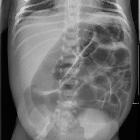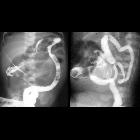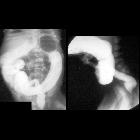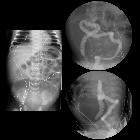ileal atresia















Ileal atresia is a congenital abnormality where there is significant stenosis or complete absence of a portion of the ileum. There is an increased incidence in those with chromosomal abnormalities.
This article will focus on ileal atresia alone but bear in mind that some cases correspond to jejunoileal atresia and show a mixed pattern, including the ones discussed in the jejunal atresia article.
Pathology
Ileal atresia results from a vascular accident in utero that leads to decreased intestinal perfusion and subsequent ischemia a segment of bowel. This leads to narrowing, or in the most severe cases, complete obliteration of the intestinal lumen.
Associations
- cystic fibrosis: ~25% of cases
Radiographic features
Plain radiograph
In the postnatal period, an abdominal radiograph will show air in the dilated loops of proximal bowel.
Fluoroscopy
Enema shows microcolon.
Antenatal ultrasound
An ileal atresia is often discovered prenatally at a routine prenatal ultrasound scan or following the development of polyhydramnios. On ultrasound, there is frequently a proximal dilated intestinal segment.
Treatment and prognosis
Surgical treatment depends on the severity of obstruction and length of the damaged bowel but is usually curative.
See also
Siehe auch:
- Ileum
- Mekoniumileus
- Ösophagusatresie
- Analatresie
- zystische Fibrose
- Morbus Hirschsprung
- Polyhydramnion
- Duodenalatresie
- jejunoileal atresia
- Kolonatresie
- low bowel obstruction
und weiter:

 Assoziationen und Differentialdiagnosen zu Ileumatresie:
Assoziationen und Differentialdiagnosen zu Ileumatresie:








